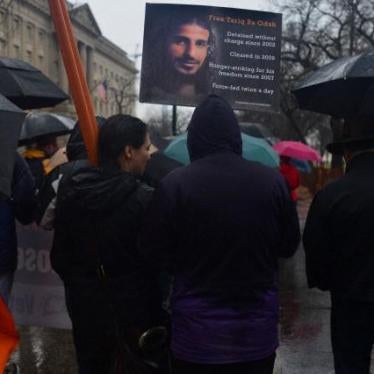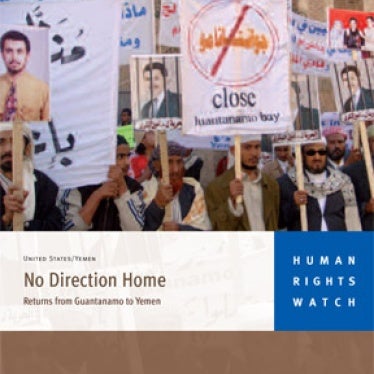September 1, 2015
Barack Obama
President of the United States of America
The White House
1600 Pennsylvania Avenue
Washington, DC 20500
Re: Plan to close the Guantanamo Bay detention facility
Dear President Obama,
I write on behalf of Human Rights Watch concerning recent reports of an administration plan to close the military detention facility at Guantanamo Bay that would include transferring a number of detainees there to the United States.
The US has held people indefinitely, without charge or trial, at Guantanamo Bay for nearly 14 years, in violation of international humanitarian law on the detention of captured combatants and others and the due process protections of international human rights law. While your administration has made some progress towards ending this injustice by transferring more than 100 detainees to other countries, 116 men remain there. The overwhelming majority of these detainees are in legal limbo: they face no criminal charges, yet they also have no sense of when, if ever, they will be released. Many have been cleared for release years ago. Their communications with relatives are limited to letter writing and, in at least some cases, occasional calls or video messages that are strictly monitored. The numerous hunger strikes engaged in by detainees seem to reflect despair over the indeterminacy of their detention. This situation should end, not only for humanitarian and legal reasons, but also because ongoing indefinite detention at Guantanamo serves as a rallying cry for armed groups abroad who threaten US security interests.
We are encouraged by the recent appointment of Lee Wolosky as State Department Guantanamo envoy, and news stories that your administration has secured places in a dozen countries for nearly half of the 52 detainees currently cleared for release. These releases should take place as soon as possible.
But we are deeply troubled by reports about certain aspects of your administration’s plan to close Guantanamo, including that your administration intends to continue to indefinitely detain at least some Guantanamo detainees on US soil; that it may place detainees transferred to the US in so-called supermax facilities that would worsen their existing conditions of confinement; and that the US may place improper new restrictions on the rights of detainees held in the US. We address each of these concerns below.
-
Plan should end all indefinite detention without charge or trial
-
Plan should not worsen detainees’ conditions of confinement
-
Plan should not allow for new restrictions on the rights of detainees transferred to the US
exception of those transferred to the US; could be read to narrow the scope of habeas
even for those transferred to the US (Sec. 1032 (e)(2)); and could be read to strip
detainees transferred for medical treatment of their basic rights (Sec. 1034(f)(2) and
(3)(B)). We urge you to push back on efforts to include these provisions—which raise
due process concerns under both constitutional and international law—in the NDAA.
Executive Director
Human Rights Watch







